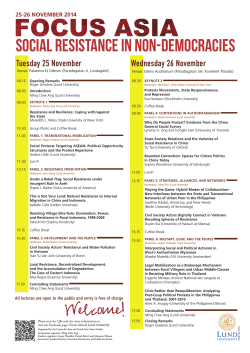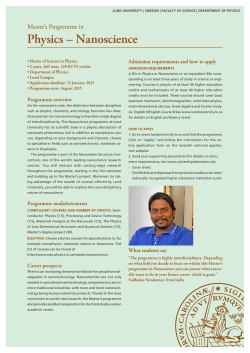
CRISIS4 | CALL FOR PAPERS
CRISIS4 | CALL FOR PAPERS 4TH INTERNATIONAL CONFERENCE ON CRISIS COMMUNICATION IN THE 21ST CENTURY OCTOBER 7–10, 2015 IN HELSINGBORG, SWEDEN 2 INTERSECTIONS 4th International Conference on Crisis Communication in the 21st Century October 7–10, 2015 in Helsingborg, Sweden Hosted by Lund University, Campus Helsingborg and the International Research Group on Crisis Communication (IRGoCC) Partner: Temporary Working Group on Crisis Communication (@ECREA) and Swedish Civil Contingencies Agency (MSB) First call for papers The fourth international conference, organized by Department of Strategic Communication, Campus Helsingborg, Lund University, Sweden, will take place on October 7–10, 2015 . The theme of the conference is Intersections that encompass themes as internal/external communication, social media and transboundary crises. The Intersections theme seeks to capture the idea that crises are critical points where various topics intersect and reflect the complex nature of crises. Crisis communication requires crisis managers to address both internal audiences (such as employees) and external audiences (such as consumers and citizens). Crises connect internal and external communication. Crisis communication balances the needs of management (what is good for the organization) and the needs of stakeholders, especially victims. Crisis communication must leverage all possible communication channels demanding an ability to integrate and to utilize both social media and traditional media. Crisis communication is required in both corporate and political crises. Crises can force the corporate and political realms to work together or creates conflict between the two. The general theme examines the various applications of crisis communication at the points of intersection. FOUR INTERSECTIONS The tentative sub-themes would be the four primary inter-sections: corporate–political, social–traditional media, management–stakeholders, and internal–external. • Corporate–Political: research under this sub-theme would examine the tensions created when corporations and political actors are involved in the same crisis, the performance nature of political crises (evaluation of how political actors perform during the crisis), the utilization of crisis exploitation in political crises and potential application to corporate crises, and how corporations and political actors can work to create crisis preparedness and resilience. •Social–Traditional Media: research under this subtheme would explore applications of social media during a crisis, the continuing role of traditional media during a crisis, the value of a media approach to crisis communication, the role of social media and traditional media in promoting resilience, and the tensions between social and traditional media during a crisis. • Management–Stakeholders: research under this 3 sub-theme could examine the tensions between management and stakeholder interests during a crisis, the unique demands of victim management in a crisis, the emotional demands of crises on management and stakeholders, and understanding the variety of stakeholders that emerge during a crisis. •Internal–External: research under this sub-theme could examine the role of internal communication during a crisis, the role of employees during a crisis, the tensions between internal and external demands during a crisis, and internal communication processes that shape external communication during a crisis. format, in 1.5 line spacing and 12 point Times New Roman font size. The deadline for submissions is April 15, 2015. Please send the abstract to: crisis4@isk.lu.se. Notifications of acceptance will be sent through an e-mail by June 1, 2015. Please note: Authors should submit only one abstract as main author and not more than one further abstract as co-author. This applies to papers submitted for review as well as invited papers. Inquiries to the conference chairs should be directed to Jesper Falkheimer (Jesper.Falkheimer@isk. lu.se) or Mats Heide (Mats.Heide@isk.lu.se). For more information, please visit the conference website. SUBMISSIONS KEYNOTE SPEAKER Presentation proposals in English language are to be submitted as meaningful extended abstracts (max. 500 words, references excluded). Abstracts should state the title of the presentation, purpose, theoretical approach, methodology, (expected) findings, implications, relevance, and originality of the study. Include contact information for all authors (name, position, organization, mail address, email address and phone). Abstracts must be presented in Word Professor Arjen Boin, Leiden University. CONFERENCE CHAIRS Professor Timothy Coombs, University of Central Florida, and Professor Jesper Falkheimer, Lund University. COORDINATOR Professor Mats Heide, Lund University. Lunds Universitet | Ihil enisti sum eum et eos aspient re liquiae ctempore www.isk.lu.se/crisis4 LUNDS UNIVERSITET Box 117 221 00 Lund Tel 046-222 00 00 www.lu.se
© Copyright 2025










